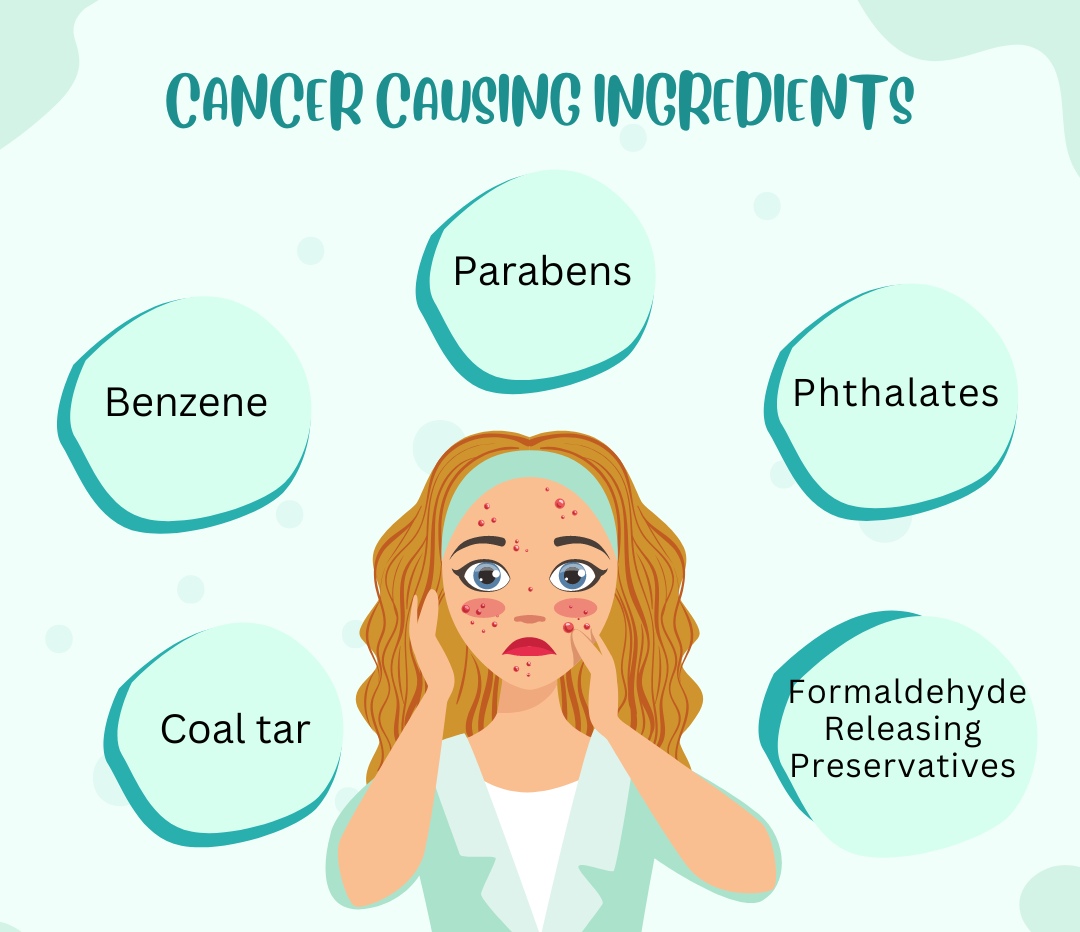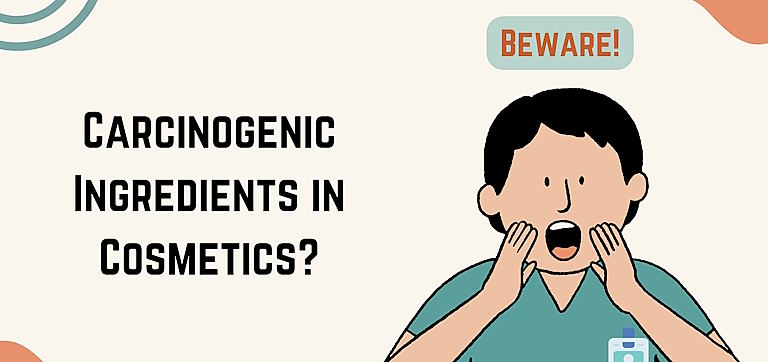Are Your Acne Products Cancer-Causing? Hidden Dangers Revealed!
Table of Contents
In recent years, there has been a growing awareness and concern about the ingredients used in skincare products. Consumers are becoming increasingly vigilant about the potential health risks associated with the chemicals they apply to their skin daily.
Among these concerns, the presence of carcinogenic, or cancer-causing, substances in acne products has sparked considerable alarm. As we delve into the specifics of this issue, our focus will be on examining acne products for such dangerous ingredients.
In the following sections, we will explore the connection between acne products and cancer, identify specific products and ingredients that may be harmful, and provide practical advice on choosing safer alternatives. By the end, you will be equipped with the information needed to protect yourself from potentially hazardous acne treatments and make safer, more informed decisions about your skincare routine.
Top Cancer-Causing Products in Skincare
Several skincare products have been found to contain ingredients that are linked to cancer. Here are some of the most notable ones:

- Formaldehyde-Releasing Preservatives: Commonly found in shampoos, conditioners, body washes, and skin moisturizers.
- Coal Tar: Present in dandruff shampoos, psoriasis treatments, and some anti-aging creams.
- Parabens: Used as preservatives in a wide range of cosmetics, including moisturizers, makeup, and shaving products.
- Phthalates: Often found in nail polishes, hair sprays, and fragrances.
- Benzene: Detected in some acne treatments, sunscreens, and moisturizers.
Why These Products Are Considered Dangerous
- Formaldehyde-Releasing Preservatives: Formaldehyde is a well-known carcinogen. Even though it is not always listed as an ingredient, certain preservatives such as DMDM hydantoin, diazolidinyl urea, and quaternium-15 release formaldehyde over time. According to research, prolonged exposure to formaldehyde can increase the risk of developing nasopharyngeal cancer and myeloid leukemia.
- Coal Tar: Coal tar is used for its anti-inflammatory and anti-itch properties, particularly in treating psoriasis and dandruff. However, the International Agency for Research on Cancer (IARC) classifies coal tar as a Group 1 carcinogen, indicating that it is carcinogenic to humans. Studies have linked long-term use of coal tar products to an increased risk of skin cancer .
- Parabens: Parabens are preservatives that prevent the growth of bacteria and mold in cosmetic products. Research has shown that parabens can be absorbed through the skin and mimic estrogen in the body, potentially disrupting hormone function. A study published in the Journal of Applied Toxicology found parabens in the tissue of breast cancer patients, suggesting a possible link to cancer development.
- Phthalates: These chemicals are used to make plastics more flexible and are found in various personal care products. Phthalates are known endocrine disruptors, which means they can interfere with the body’s hormonal system. According to research, exposure to high levels of phthalates has been associated with an increased risk of breast cancer and reproductive toxicity.
- Benzene: Benzene is a volatile organic compound that has been detected in some acne treatments, sunscreens, and moisturizers. The U.S. Environmental Protection Agency (EPA) and the IARC classify benzene as a Group 1 carcinogen, indicating there is sufficient evidence that it causes cancer in humans. Studies have linked benzene exposure to an increased risk of leukemia and other blood disorders.
Specific Mention of Acne Products within This List
Among the acne products that have raised concerns are those containing benzene and certain parabens. For instance, a study published in the journal JAMA Network Open found that several popular sunscreens and after-sun products contained benzene, a known carcinogen. Given that many acne treatments include sunscreen components to protect sensitive skin, this contamination is particularly troubling.
Furthermore, acne products such as certain cleansers and spot treatments may contain parabens. These ingredients are used to extend the shelf life of products but carry potential risks as endocrine disruptors and possible carcinogens. The presence of such harmful substances in products intended for daily use by individuals seeking to treat their acne underscores the importance of being vigilant about the ingredients in skincare products.
By being aware of these cancer-causing ingredients and their potential presence in acne products, consumers can take proactive steps to protect their health. Choosing products that are free from these harmful substances is a crucial step towards safer skincare routines.
Benzene in Acne Products
Benzene is a colorless, flammable liquid with a sweet odor. It is commonly used in the manufacturing of plastics, rubber, lubricants, dyes, detergents, and pesticides. However, benzene is also a known carcinogen, meaning it has been linked to cancer development in humans.
Long-term exposure to benzene can lead to various types of cancer, including leukemia and lymphoma. Benzene enters the body primarily through inhalation or skin absorption.
Benzene Acne Products List
Several acne products have been found to contain benzene, posing a significant health risk to consumers. Some of these products include:
- Acne spot treatments
- Acne cleansers
- Acne creams or gels
- Acne face masks
- Acne toners or astringents
To protect yourself from potential benzene exposure, it is crucial to avoid acne products that contain this harmful chemical. When purchasing acne treatments, carefully read product labels and avoid products that list benzene or benzene-derived compounds among their ingredients. Additionally, look for products that are labeled as benzene-free or certified by reputable organizations for their safety.
Benzoyl Peroxide and Cancer Risk
Benzoyl peroxide is a widely used over-the-counter medication for treating acne. It works by killing acne-causing bacteria, reducing inflammation, and helping to unclog pores. Benzoyl peroxide is available in various formulations, including creams, gels, lotions, and cleansers, and is often recommended as a first-line treatment for mild to moderate acne.
Does Benzoyl Peroxide Cause Cancer?
Despite its effectiveness in treating acne, there has been ongoing debate about whether benzoyl peroxide poses a cancer risk. According to the American Cancer Society, there is currently no evidence to suggest that benzoyl peroxide causes cancer in humans.
Numerous scientific studies and health organizations have evaluated the safety of benzoyl peroxide and have not found any conclusive evidence linking it to cancer development.
Identifying Products with Benzene
Identifying acne products that contain benzene can be challenging, as manufacturers are not always required to disclose the presence of benzene on product labels. However, some products have been found to contain benzene through independent testing or regulatory investigations. These may include certain brands of acne spot treatments, cleansers, creams, and masks.
Therefore, purchasing products from reputable brands with a history of quality and safety can help reduce the risk of exposure to benzene-containing products.
Importance of Reading Labels
Reading product labels and ingredient lists is essential for identifying and avoiding acne products that contain benzene or other harmful substances. Familiarize yourself with common benzene-derived compounds, such as benzyl alcohol or benzyl acetate, and be cautious when purchasing products that contain these ingredients. By being diligent about reading labels, you can make more informed decisions about the skincare products you use.
Other Potentially Harmful Ingredients in Skincare
Several other common carcinogenic ingredients may be found in skincare products, including:
- Hydroquinone: Used in skin-lightening creams and treatments.
- Triclosan: Found in antibacterial soaps and cleansers.
- Talc: Found in powders, blushes, and certain foundations.
- Toluene: Found in nail polishes and hair dyes.
Tips for Choosing Safer Alternatives
To reduce the risk of exposure to harmful ingredients, consider the following tips when selecting skincare products:
– Opt for products labeled as “natural,” “organic,” or “hypoallergenic.”
– Choose products with simple ingredient lists and avoid those containing potentially harmful chemicals.
– Research product ingredients and consult reputable sources for information on product safety.
– Consider seeking guidance from dermatologists or skincare professionals when choosing products for specific skin concerns.
Recommendations for Safe, Effective Acne Treatments
There are many safe and effective acne treatments available that do not contain harmful ingredients. Consider the following options:
– Salicylic acid: Helps to unclog pores and reduce inflammation.
– Retinoids: Promote cell turnover and prevent the formation of new acne lesions.
– Sulfur: Has antibacterial and anti-inflammatory properties.
– Tea tree oil: Has antimicrobial properties and can help reduce acne lesions.
Some brands are known for their commitment to safety and quality in skincare products. Look for products from trusted brands that prioritize ingredient transparency and adhere to strict manufacturing standards. Reputable brands often invest in research and development to ensure their products are effective and safe for consumer use.
Conclusion
In conclusion, the presence of cancer-causing ingredients in acne products underscores the importance of being vigilant about the products we use on our skin. By educating ourselves about harmful ingredients and making informed choices, we can minimize the risk of exposure to potentially hazardous substances.
It is essential to read product labels, research ingredients, and choose products from reputable brands known for their safety and quality. By prioritizing safety in our skincare routines, we can protect our health and well-being while achieving clear, healthy skin.
FAQs
-
Are acne products linked to cancer?
Acne products, such as topical creams and gels, are generally considered safe when used as directed. There’s no conclusive evidence linking them directly to cancer. However, some ingredients (like benzoyl peroxide) may cause skin irritation or allergic reactions in sensitive individuals. Always follow instructions and consult a dermatologist if you have concerns.
-
What acne medication is being recalled in 2024?
In 2024, certain benzoyl peroxide products were recalled due to potential benzene contamination. Benzene is a known carcinogen. Check FDA announcements or consult a pharmacist for specific brand names affected by the recall.
-
What acne products contain benzene?
Some benzoyl peroxide products were found to contain benzene. It’s crucial to check product labels and stay informed about recalls. Look for benzene-free alternatives.
-
Do all benzoyl peroxide products contain benzene?
No, not all benzoyl peroxide products contain benzene. However, due to recent recalls, it’s essential to verify product safety. Always read labels and consult healthcare professionals if you have any doubts.
References
- National Cancer Institute. Formaldehyde and Cancer Risk. Available at: https://www.cancer.gov/about-cancer/causes-prevention/risk/substances/formaldehyde/formaldehyde-fact-sheet
- International Agency for Research on Cancer. IARC Monographs on the Evaluation of Carcinogenic Risks to Humans: Volume 100F. Available at: https://publications.iarc.fr/Book-And-Report-Series/Iarc-Monographs-On-The-Identification-Of-Carcinogenic-Hazards-To-Humans/Some-Aromatic-Amines-Organic-Dyes-And-Related-Exposures-2010
- Darbre, P.D., et al. (2004). Concentrations of parabens in human breast tumours. Journal of Applied Toxicology, 24(1), 5-13.
- National Toxicology Program. Phthalates Information. Available at: https://ntp.niehs.nih.gov/whatwestudy/topics/phthalates/index.html
- American Cancer Society. Benzene and Cancer Risk. Available at: https://www.cancer.org/cancer/cancer-causes/benzene.html
- Valisure. Valisure Citizen Petition on Benzene in Sunscreen and After-sun Care Products. Available at: https://www.valisure.com/blog/valisure-news/valisure-detects-benzene-in-sunscreen/
Post by:
Dr.Marcella Jiovanni
Health and Beauty Expert
“Marcella Jiovanni actively promotes the importance of maintaining healthy skin, she envisions the future of dermatology as moving away from pure medical, pharmacological dermatology and flowing more toward a holistic approach to wellness and skincare.”


















